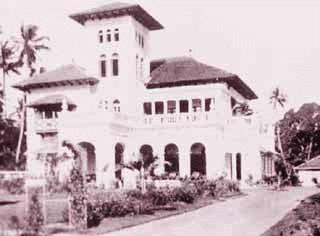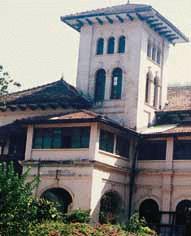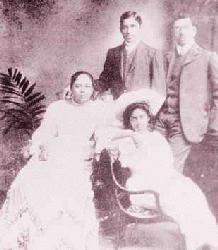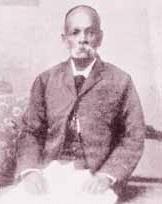 Year on the Web
Year on the Web Year on the Web
Year on the Web




 Left:
Thehouse as pictured in Twentieth Century Impressions' published in 1907
Left:
Thehouse as pictured in Twentieth Century Impressions' published in 1907
Right: Today
- being taken apart
Residents in Colombo have been some-what dismayed
by the destruction of one of the city's former landmarks, a pink-walled mansion
that graced the Galle Road. The building, many of us would remember as Chinese
Lotus Hotel. A formerly imposing colonial structure, now dwarfed by the huge
high-rise buildings around, it stands at the Kollupitiya junction, next to the
National Savings Bank building and Carnival Ice Cream shop. Soon it will be no
more. The present owners of the building are taking down the huge house to make
way for development. Already the back portion of the house is dismantled, the
antique Burma Teak door and window frames and the old bricks put up for sale by
the contractors.
The house has a name. It was called Isabel Court, presumably after the original owner's second wife who was Isabella Silva. Her husband, Nanayakkarage Don Paulis Silva was known the 'Plumbago King' in his time and was a successful merchant, who owned several large stately homes. Isabel Court in Kollupitiya was used as N.D.P. Silva's office in Colombo. The wealthy merchant also had a health resort and country bungalow in Kalutara by the Kalu Ganga, the well known Teak Bungalow of yore. He died in 1901 leaving his extensive estate in the hands of two sons- the younger of whom was to later outdo his father in his style of living and recreation.

 Left: Isabella Silva (L) with the family
Left: Isabella Silva (L) with the family
Right: N.
D.P. De Silva
The younger son was bestowed the title Padikara Mudaliyar
and was responsible for the wonderful mansion we all know now as Richmond Castle
in Kalutara. The story goes that the young Mudliyar built the grand mansion,
un-rivalled in this country, along the lines of an Indian Maharaja's mansion to
impress his future wife's family, since they had initially been reluctant to
agree to the marriage.
The family warrants a mention in the Twentieth Century Impressions of Ceylon, that documented the country's most prestigious families. N. D. P. Silva came from an old and distinguished family from Galle. He was born in 1838 in Baddegama, 13 miles from Galle. He was orphaned at a very young age and then moving out of his village, selling the small family fortune, moved to Colombo and proceeded to make his wealth. His businesses varied. Owning large number of plumbago mines and estates of tea, coffee, coconut and spices, he was also a man who gave generously to various charities and contributed to the welfare of many a Catholic school. His parents were Buddhists converted to Christianity.
Twice married, N.D.P Silva's second wife was Pagoda Wijeyasinghe Aratchige Dona Isabella Wijeyasinghe.
In his sixty third year, N. D. P. Silva's health began to fail and he passed away in May 1901. No date is given on the construction of Isabel Court, or for that matter any of the merchant's homes. But it bears striking resemblance in style of architecture to College House, the building that houses the Colombo University dons and office.
The four storied tower is an interesting feature in Isabel Court. The rest of the house is two storied. A narrow flight of carved teak stairs leads up to the tiny tower rooms, which afford a marvellous view of the sea. In the good old days when the landscape was a lot less cluttered, the view must indeed have been splendid.
Years of neglect were apparent in the rotted ceilings and shaky upper flooring. The ornate balconies and some door frames were chipped and peeling.
The ground floor was built with an intricately tiled floor, which is now being gradually broken off. One distant relative said that these tiles are quite identical to the ones that decorate the floor of Richmond Castle, which now belongs to a trust board and is run as an orphanage. From the 1960's the house was rented out to Chinese businessmen who ran a restaurant there.
Jailubdeen Nilam, one of the five brothers who now owns the building and the land around it, said the house has been in his family for three generations but they are bringing it down to make way for development. So development catches up with Isabel Court and the old must necessarily yield to the new. Colombo will continue to grow and expand and unfortunately for Isabel Court, it stands in prime commercial property, and is worth and much more in the present than N. D. P. Silva, the astute businessman that he was, would ever have guessed.
Return to the Plus contents page







Please send your comments and suggestions on this web site to
info@suntimes.is.lk or to
webmaster@infolabs.is.lk